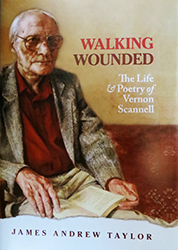The little miracle – Vernon Scannell’s final triumph
Extract from Chapter 15, Walking Wounded – the Life and Poetry of Vernon Scannell
And now, surely, the story should be over, and the last book written. But at the end of June 2007, John Lucas, whose Shoestring Press had published Behind the Lines three years earlier, received in the post what Scannell admitted was a “very unlikely” proposal:
“When I became bed-ridden about six months ago, I found to my great surprise that I was writing verse again after a long lay-off. I produced these poems – 18 of them – in about five months. I’m pretty sure there are no more to come. It occurred to me that these, or some of them, might make a booklet. Last Post might do for the title.”
This, if anything, was “the little miracle, the divine accident” that he had hoped for. Lucas was astounded by the poems that accompanied the letter. Among them were some of the best that Scannell had ever written.
“I knew how ill he was, and I was amazed that someone at death’s door could write such lucid, marvellously well-constructed poems. I was bowled over by them. They were so accomplished – not at all the poems you might expect from a sick man.”
Lucas worked quickly, and Last Post, a slim pamphlet of 20 pages, was published in September. Many of the poems, perhaps inevitably, look back over Scannell’s life: A Few Words to the Not-So-Old, the last poem in his last collection, describes the gradual fading of memory, but ends with the well-remembered smile of a soldier killed more than sixty years before. In War Words, news of fighting in Iraq brings back memories of the D-Day landings … Several of the poems in Last Post deal squarely with the experience of growing old and dying. Missing Things, for instance, charts the life that the poet is regretfully leaving behind:
“Those Paris streets and bars I can’t forget,
the scent of caporal and wine and piss;
the pubs in Soho where the poets met;
the Yorkshire moors and Dorset’s pebbly coast,
black Leeds where I was taught love’s alphabet,
and this small house that I shall miss the most.”
The poem is calm, measured and wistful, but without self-pity. After his death, he says, he will know and feel nothing:
“like the stone of which the house is made,
I’ll feel no more than it does light and air.
Then why so sad? And just a bit afraid?”
[Two months later, after he had held the book in his hand, Scannell was dead]
Click here to buy the Book: http://bit.ly/WWounded
